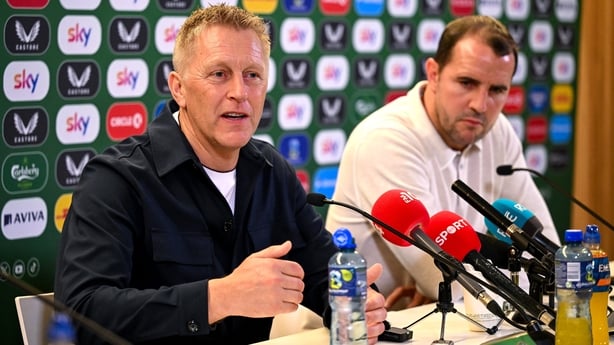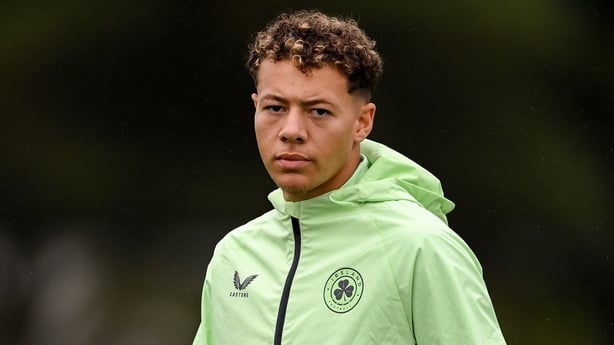The first match of a new managerial era and our new gaffer, Heimir Hallgrimsson, is going in search of lost b*****ds.
Hallgrimsson, appointed from left field in early June, is the third foreign manager of the Republic of Ireland men's senior team and takes over at the least promising time.
Jack Charlton had gotten the job ahead of Bob Paisley in contentious circumstances in 1986 and spent his first press conference, in his own words, answering why "everyone in the world hadn't got the job except me".
His first game was a miserable 1-0 friendly loss at home to Wales, when he let Mick Byrne pick the team and where the crowd famously unveiled signs saying 'Go Home Union Jack'.
Giovanni Trapattoni, by contrast, arrived on a wave of starry-eyed goodwill, the fans giddily excited that Serie A royalty was gracing us with his presence after the mad-cap Steve Staunton reign. Trap's first match was a 1-1 friendly draw with Serbia in Croke Park, in 2008 his early favourite Andy Keogh ("KEEEE-OH," cried the Sky Sports man) lamping home a late equaliser.
Hallgrimsson makes his opening bow in very different circumstances to that of Trap, in particular.
The FAI is operating in a much altered financial environment these days and the incoming gaffer has no local billionaire topping up his wages. As Ken Early disclosed last week, in an entertaining remembrance of Poland in 2012, whenever Trap and Marco Tardelli had to partake in some bizarre or hipster-y media engagement that left them befuddled, the utterance of the single word 'Benefattore' would forestall any further questions.
Owing to the comically protracted managerial search this time around, the new boss does not have a large suite of friendlies to road-test his theories on what's required, as Trap and Charlton did. In his first spell as Ireland manager, Mick McCarthy had no fewer than eight games, the first seven of which he failed to win, before his first qualifier against Liechtenstein.
It's just under three months since Hallgrimsson was announced as the new Republic of Ireland manager to much shock, and no little confusion.

Given the restless mood of the Irish football family, the FAI probably rightly determined that an exotic unknown was preferable to some dreary safe-pair-of-hands from the English Championship.
The parade of middle-of-the-road jobbers and same-old-faces from the English game that were being floated during the long search had, it's fair to say, provoked despairing apathy among the fanbase. In that context, an 'Arsene Who?' style appointment was worth the risk.
By the time the white smoke appeared on the morning of 10 June, it was assumed that John O'Shea was going to be crowned following his interim spell, which didn't thrill the masses but did yield a notable, if lucky, win at home to Hungary.
When the press release came through containing Hallgrimsson's name, the assorted journalists squinted at it for a few seconds to see if they were reading right.
His Wikipedia page almost crashed that morning, with Irish fans rushing to establish the credentials of our new numero uno.
We discovered that he had been co-manager of Iceland when they famously downed England on the day after Ireland exited Euro 2016 - even if his counterpart Lars Lagerback was the name more frequently invoked down here and had been perceived as the senior man in the partnership.
Hallgrimsson took sole charge for the subsequent campaign, guiding Iceland to a first ever World Cup after topping a qualification group containing Croatia, Ukraine and Turkey.
The Icelanders, with a population smaller than Connacht, were a phenomenon and a renowned footballing curiosity in the 2010s, the masters of extracting the maximum from minimal resources. Football writers were dispatched on long-read assignments to get the lowdown on what they were doing so right.
His stint in Jamaica was more underwhelming, though they did qualify for the Copa America before bouncing out in the group stages after losing all three matches.

Marc Canham's claim that Hallgrimsson had been the first-choice candidate all along attracted derision, though he did have the ample international experience that Neil Lennon said the FAI had stressed as an essential during the interview process.
Given the restless mood of the Irish football family, the FAI probably rightly determined that an exotic unknown was preferable to some dreary safe-pair-of-hands from the English Championship.
During the dying embers of the Stephen Kenny era - his supporters having conceded the argument after Athens in June - there were those who insisted his basic philosophy towards playing attacking football was sound, it just needed some tactical tidying up here and there.
Then there were the others - the pessimists - who insisted that the whole lofty ambition of playing 'progressive' football was the problem from the beginning. That relying on the guile of an essentially guileless midfield wasn't a wise strategy in the international arena.
And that during his three-and-a half-year reign, Kenny, aside from blooding a host of youngsters, had only managed to highlight the wisdom of his predecessors.
When outlining his ideal candidate to Tony O'Donoghue back in February, Canham said he didn't foresee a major gear change from the Kenny template but wanted "a more adaptable and pragmatic approach to games against teams who have a higher ranking than ours", the latter being a steadily expanding group. (No doubt, if asked, Kenny probably wouldn't identify his own approach in such games as "unpragmatic".)
Hallgrimsson's rhetoric this week suggests he's inching towards the latter view. The phrase "back to basics" has been deployed, with the Icelandic coach promising not to "overload them (with tactical instructions), that messes with their heads."
"Hallgrimsson has struck a more cautious note, pinpointing remaining in League B as his bottom line"
In a forum where he answered fans' questions last week, he spoke of his desire to get a "b*****d" in the team and suggested that the current squad were "a little too nice," opening up the possibility that we could see some Roy Keane style reducers early doors as the players seek to impress the new chief.
In English football in the 2000s, there was a tradition that the incoming manager had to be the antithesis of his predecessor. Thus, the coolly detached Sven replaced the excessively emotional Kevin Keegan; the nearest available Englishman Steve McClaren had to replace the Swede Eriksson; high-powered foreign hot-shot Capello succeeded the humble McClaren.
Whereas Kenny was fond of bullish predictions, such as his insistence that Ireland were in position to top their 2022 Nations League group, Hallgrimsson has struck a more cautious note, pinpointing remaining in League B as his bottom line.
In contrast to Trap ("In Ireland, there is no league"), Hallgrimsson hasn't been shy of being seen at League of Ireland grounds of a Friday night, the LOI being a more important political constituency and powerbase than it was in Trapattoni's time.
There's an element of back-to-the-future with his touting of the granny rule as an avenue for securing players. Latterly, the granny rule terrain, aka England, hasn't been as fertile a ground for Irish international footballers as it was back when the Celtic Tiger was just a glint in the IDA's eye.
The suspicion remains that the connection with the old country isn't as recent or as visceral as it was for the 80s crop. The fear is that the current generation among the diaspora aren't as staunch, the Rice and Grealish business suggesting as much.

But Hallgrimsson has already drafted in Leicester City winger Kasey McAteer, with another English-born player, Sammie Szmodics, showing promise in the b*****d department, alongside a touch of badly needed flair.
The FAI's video previewing the England game invoked our past triumphs and glorious moments in the fixture going back to 1949, tastefully omitting the Covid friendly between the sides in Wembley and the infamous motivational video, which sparked off a chain reaction that led to Damien Duff departing the set-up.
A heavy loss on Saturday might be slightly damaging from a goodwill perspective for the incoming manager, though he has hinted that the subsequent games against Greece and Finland are the more relevant from an Irish perspective.
Listen to the RTÉ Soccer podcast on Apple Podcasts, Spotify or wherever you get your podcasts.
Watch Republic of Ireland v England in the UEFA Nations League on Saturday from 4pm on RTÉ2 and RTÉ Player. Follow a live blog on rte.ie/sport and the RTÉ News app and listen to commentary on RTÉ Radio 1.


